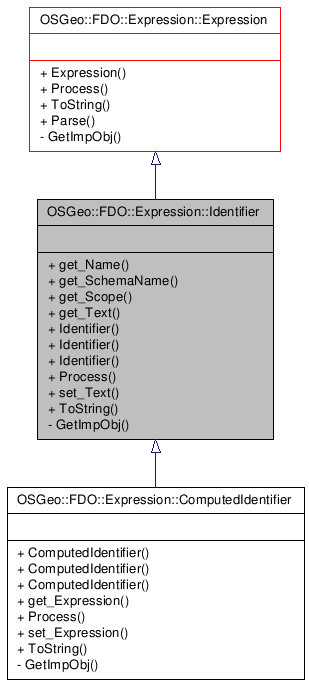
| FDO .NET API Reference | Feature Data Objects |
Inherited by OSGeo::FDO::Expression::ComputedIdentifier.
Inheritance diagram for OSGeo::FDO::Expression::Identifier:

()
Definition at line 39 of file mgIdentifier.h.
Public Member Functions | |
| __property System::String * | get_Name () |
| Gets just the name of the identifier, with any scope stripped off. | |
| __property System::String * | get_SchemaName () |
| Gets the schema name part of the identifier. | |
| __property System::String * | get_Scope ()[] |
| Gets the scope of the identifier as an array of strings. | |
| __property System::String * | get_Text () |
| Gets the full text of the identifier. | |
| Identifier (System::IntPtr unmanaged, System::Boolean autoDelete) | |
| Constructs a Identifier object based on an unmanaged instance of the object. | |
| Identifier (System::String *text) | |
| Constructs an instance of an identifier using the specified arguments. | |
| Identifier () | |
| Constructs a default instance of an identifier. | |
| System::Void | Process (OSGeo::FDO::Expression::IExpressionProcessor *processor) |
| Overrides Expression.Process to pass the Identifier to the appropriate expression processor operation. | |
| __property System::Void | set_Text (System::String *value) |
| Sets the full text of the identifier. | |
| System::String * | ToString () |
| Returns the well defined text representation of this expression. | |
| Comments or suggestions? Send us feedback. |